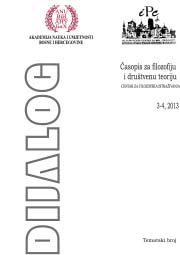Rodno diskriminirajuće kulturalne prakse i običaji tradicionalnih patrijarhalnih mizogenih zajednica
Gender discriminating cultural praxis and values of traditional patriarchal misogynistic communities
Inscription and presupposition of de constitutional conjures of gender equal picture
Author(s): Lejla MušićSubject(s): Gender Studies, Culture and social structure , Social differentiation, Studies in violence and power, Human Ecology, Nationalism Studies, Victimology, Sociology of Culture
Published by: Akademija Nauka i Umjetnosti Bosne i Hercegovine
Keywords: Sati; bounding foot in China; female mutilation; male mutilation;
Summary/Abstract: Question of culture/nature difference is one of the key questions, to which mistakable interpretations, result in patriarchal oppression over female and nature. Misogynistic matrix of behavior is founded in this conception, therefore women represent nature, emotional principle, and men represent culture or rational principal. There are continual examples, of patriarchal praxis and values, which are in contradiction to Ruling Conventions, on Women Human Rights Protection. These praxes are in the domain of traditional particular praxis of individual cultures, and therefore, particular praxis, that are usually different of dominant culture praxis. Sati in India, foot binding in China, female genital mutilation originating from African rituals, are only several out of them. The dominant Legal norms, refuse to accept, those praxis, but in closed particular communities, the rituals of socialization and cultural praxis involve female sacrifices, in different ways, and females are prepared , from their early childhood, to accept “ Great sacrifices” , as though if the only true life goal of femininity is to be victim, to be victim for others, or even more tragically “ enjoy in oneself sacrifice for Others” especially if the victim is to be done for masculine representatives or leaders of communities, for which women are respectable only if they are a victim.
Journal: Dijalog - Časopis za filozofiju i društvenu teoriju
- Issue Year: 2013
- Issue No: 03+04
- Page Range: 75-94
- Page Count: 20
- Language: Bosnian

